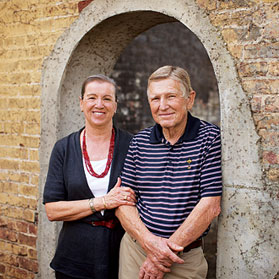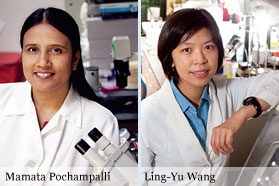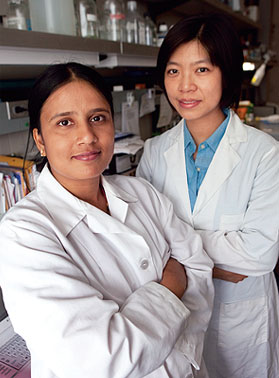Benefactors: Auburn community's endowment fund fuels discovery engine
 "This doesn't just happen with one or two guys. We've been successful because a whole bunch of people in Auburn and the surrounding area have donated their money, time and talents to this cause."
"This doesn't just happen with one or two guys. We've been successful because a whole bunch of people in Auburn and the surrounding area have donated their money, time and talents to this cause."
Finding funds to support pioneering laboratory work is almost as arduous as the science itself. That's what makes the support of the Auburn Community Cancer Endowment Fund so vital to the UC Davis Cancer Center.
The endowment fund got its start in 2001 after three friends in the Sierra foothills city got together over a cup of coffee and decided to raise money for the war on cancer. By 2006, they had enlisted dozens of friends and businesses in the campaign and had amassed a whopping $1.5 million, enough to fund an endowed chair in basic science research.
Their accomplishment was a first. While other endowed chairs at UC Davis have been named after individuals and corporations, never had one been created in honor of an entire community.
Since its establishment, the fund has produced annual dividends of about $70,000 to support work coordinated by Hsing-Jien Kung, director of basic research at the cancer center who also holds the endowed chair in basic research. Kung says the financial help from Auburn is "absolutely critical" to the cancer center's research mission, particularly at a time when the scramble for federal dollars is more competitive than ever.
"Even in a good funding climate, this endowment allows recipients to do highly innovative, 'out-of-the-box' research beyond what federal funding normally supports," Kung says.
 "Even in a good funding climate, this endowment allows recipients to do highly innovative, 'out-of-the-box' research beyond what federal funding normally supports."
"Even in a good funding climate, this endowment allows recipients to do highly innovative, 'out-of-the-box' research beyond what federal funding normally supports."
Typically, he noted, government funds are reserved for established research supported by promising data. Newer ideas that may be "a bit premature for prime time" are more difficult to fund, so the endowment "gives us much needed flexibility in our work," Kung says.
Kung joined UC Davis in 1998 as the center's deputy director and chief of basic science, and since then, he has built the research program into a powerful engine delivering advances in cancer treatment. Today, his campus lab is abuzz with the work of 10 talented students and postdoctoral researchers tackling prostate cancer and other projects.
Among them is Ling-Yu Wang, 34, who earned a Ph.D. in microbiology at UC Davis and has been a postdoctoral researcher in Kung's lab for almost four years.
Wang is studying a protein called male germ-cell-associated kinase, which is produced prolifically in prostate cancer. Wang says her goal is to understand how the protein controls several biological processes in cells and helps cancer develop.
Her work now is supported by a grant from the U.S. Department of Defense. Initially, however, Wang's efforts and supplies were paid though funds from the Auburn community fund.
"People struggle to find funding because it is so limited," Wang says, "so we very much appreciate the donations through the Auburn fund."
Another postdoctoral researcher benefiting from Auburn's largesse is Mamata Pochampalli, 33, who joined Kung's lab in 2007. Pochampalli is studying how a protein called JMJD5 affects androgen receptors in prostate cancer. She is a recipient of training fellowships from both the National Institutes of Health and Department of Defense.
Finding funds to support pioneering laboratory work is almost as arduous as the science itself. That's what makes the support of the Auburn Community Cancer Endowment Fund so vital to the UC Davis Cancer Center.
"Research in our lab, in close collaboration with another lab at UC Davis, indicates that this protein has an important role not only in prostate cancer but in several other cancers," she says. "Initially, this idea looked interesting but was risky because we did not have any data. The endowment money allowed us to pursue something that wouldn't have been possible otherwise, which is a huge benefit."
Kung says that researchers in a third project aided by the Auburn endowment are examining how withholding certain nutrients from prostate cancer cells can effectively kill those cells. Specifically, Kung says his colleagues and researchers from Richard Bold's lab have identified a particular amino acid that, when withheld, causes "nutritional starvation" in the tumor cells without harming healthy cells.
"Most cancer therapies try to poison the cancer cells, but of course this approach can have toxic side effects for patients that are sometimes devastating," Kung says. "The new trend is to starve the cells to death with a treatment that would remove certain critical nutrients from the blood, causing autophagy, or 'self-eating.'" (See "Building on basics" in this issue.)
 Since its establishment, the fund has produced annual dividends of about $70,000 to support work coordinated by Hsing-Jien Kung, director of basic research at the cancer center who also holds the endowed chair.
Since its establishment, the fund has produced annual dividends of about $70,000 to support work coordinated by Hsing-Jien Kung, director of basic research at the cancer center who also holds the endowed chair.
For Virgil Traynor, this news from the lab is immensely rewarding. Traynor, a retired veterinarian, was one of three buddies who launched the Auburn fund, and he has been a spark plug for continual fundraising ever since.
A prostate cancer survivor, Traynor says the endowment is an achievement of the many, not the few. Countless barbecues, golf tournaments, motorcycle rallies, Christmas parties, fun runs and other events – along with individual donations – have combined to make the endowment flourish.
"This doesn't just happen with one or two guys," says Traynor, who was initially spurred to action by former Auburn Mayor Dick Azevedo. "We've been successful because a whole bunch of people in Auburn and the surrounding area have donated their money, time and talents to this cause."
Among them was Pro Football Hall of Famer Jim Otto, a former Oakland Raiders player who retired in Auburn. Otto, who was treated for prostate cancer at UC Davis, and his wife, Sally, have hosted celebrity golf tournaments for the fund, raising more than $350,000.
Other large contributors include the Ladies Professional Golf Association, Auburn Harley-Davidson, Magnussen's Auburn Toyota and the Thunder Valley Casino, operated by the United Auburn Indian Community.
"We're very proud and inspired by what this has become," Traynor says. "And while I think any money that goes anywhere for cancer research is good, the advantage that we have is we personally hand them the money and get to see what happens from there."
For Kung, the personal connection also matters. Prior to joining UC Davis, he held an endowed chair at Case Western Reserve University.
"That was a single donor, a grateful patient," Kung says. "But with the Auburn fund, it's like a grassroots campaign, with contributions from multiple people who share our goal of curing cancer.
"In that way, this endowment is something that I especially cherish."







